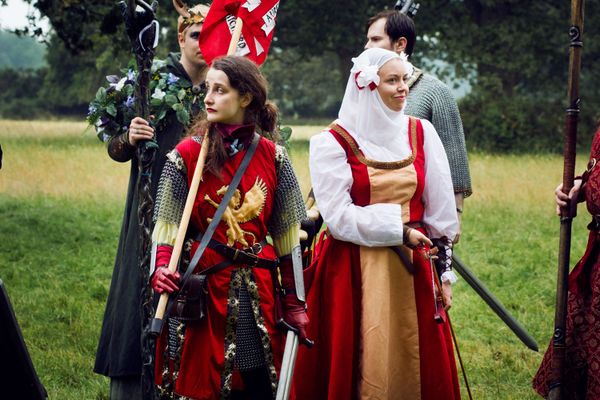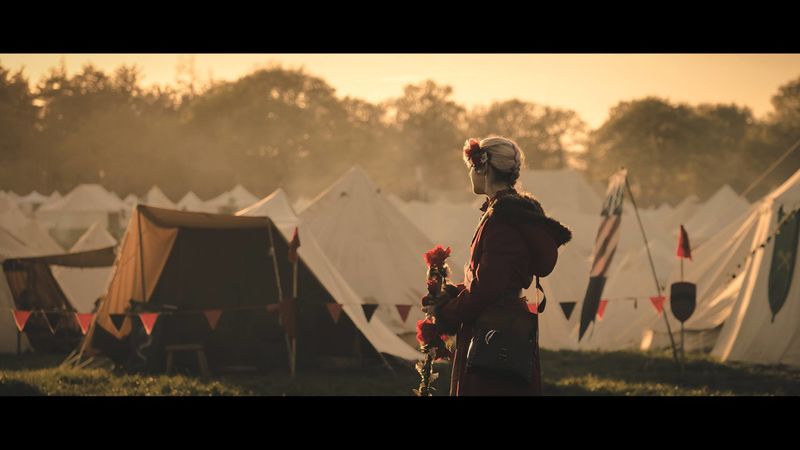Dawn
Wildwinter (talk | contribs) No edit summary |
No edit summary |
||
| (57 intermediate revisions by 9 users not shown) | |||
| Line 1: | Line 1: | ||
{{CaptionedImage|file=Glory of Dawn.jpg|caption=A great life leaves a legend.|align=right|width=600}} | |||
{{CaptionedImage|file= | |||
<quote>“Great deeds are eternal.”</quote> | <quote>“Great deeds are eternal.”</quote> | ||
Few lands espouse the heroic ideal in quite the same way the Dawnish do. When people think of the Dawn they imagine her favoured children, the nobility arrayed in armour, weapons drawn, eagerly seeking battle. Before them stand the troubadours, singing or reciting the epic lays of past heroes. Behind them, the war wizards, giving their strength to the battle. | |||
[[Knights-errant]] travel the land, seeking an opportunity to prove themselves and achieve [[glory]]. Their nobility give battle in the tourney to judge who is fit to rule. The people turn their eyes on the enemies of the Empire, seeking victory and renown. | |||
Her proud boasts are not hollow. Alone amongst the nations of the Empire, the Dawn has never given up land to the barbarians. But the aspiration to achieve great things is not just found on the battlefield. Every Dawnish feels that same urge; this is a nation that eats and drinks glory. | |||
Enemies deride the nation for its stifling and outmoded system, where might makes right and the needs of ordinary people take second place to the quest for glory. And yet, they have forgotten the truth at its core - that great deeds are eternal. | |||
==Five things about Dawn== | ==Five things about Dawn== | ||
*'''Nobility is an achievement, not a birthright.''' Nobility is vaunted in Dawn, but it is a nobility of spirit they admire, not a title that you inherit. | |||
*'''A great life leaves a legend.''' The only thing that remains when you depart this life is the memory of how you lived it. Death is nothing compared to great deeds. | *'''A great life leaves a legend.''' The only thing that remains when you depart this life is the memory of how you lived it. Death is nothing compared to great deeds. | ||
*'''Glorious in victory, proud in defeat.''' The Dawnish relish a challenge. Those more skilled present an opportunity for glory by defeating them, those less skilled offer you an opportunity to demonstrate your prowess. | |||
*'''Glorious in victory, proud in defeat.''' The Dawnish relish a challenge. Those more skilled present an opportunity for glory by defeating them, those less skilled | *'''You cannot armour the soul.''' The Dawnish do not hide the great passions of the soul; they wear their hearts on their sleeve. | ||
*'''Courtship, romance and tragedy.''' The rules of the heart are complex in Dawn; sometimes love is the greatest challenge. | *'''Courtship, romance and tragedy.''' The rules of the heart are complex in Dawn; sometimes love is the greatest challenge. | ||
==What the Dawnish are not== | ==What the Dawnish are not== | ||
*'''Chivalrous | *'''Chivalrous.''' Dawnish nobility are always intensely competitive; they don't open doors for anybody, male or female. Dawnish women are independent and as obsessed with glory as their male counterparts. | ||
*''' | *'''Required to be honourable.''' The Dawnish obsession is with triumph and renown; it does not demand a generous spirit. | ||
{{CaptionedImage|file=knight_of_roses.jpg|align=right|width=800|caption=Lady Griffinsbane surveys her nation}} | |||
{{Dawn Links}} | |||
{{pdf}} | |||
__NOTOC__ | |||
Latest revision as of 09:10, 9 August 2023
“Great deeds are eternal.”
Few lands espouse the heroic ideal in quite the same way the Dawnish do. When people think of the Dawn they imagine her favoured children, the nobility arrayed in armour, weapons drawn, eagerly seeking battle. Before them stand the troubadours, singing or reciting the epic lays of past heroes. Behind them, the war wizards, giving their strength to the battle.
Knights-errant travel the land, seeking an opportunity to prove themselves and achieve glory. Their nobility give battle in the tourney to judge who is fit to rule. The people turn their eyes on the enemies of the Empire, seeking victory and renown.
Her proud boasts are not hollow. Alone amongst the nations of the Empire, the Dawn has never given up land to the barbarians. But the aspiration to achieve great things is not just found on the battlefield. Every Dawnish feels that same urge; this is a nation that eats and drinks glory.
Enemies deride the nation for its stifling and outmoded system, where might makes right and the needs of ordinary people take second place to the quest for glory. And yet, they have forgotten the truth at its core - that great deeds are eternal.
Five things about Dawn
- Nobility is an achievement, not a birthright. Nobility is vaunted in Dawn, but it is a nobility of spirit they admire, not a title that you inherit.
- A great life leaves a legend. The only thing that remains when you depart this life is the memory of how you lived it. Death is nothing compared to great deeds.
- Glorious in victory, proud in defeat. The Dawnish relish a challenge. Those more skilled present an opportunity for glory by defeating them, those less skilled offer you an opportunity to demonstrate your prowess.
- You cannot armour the soul. The Dawnish do not hide the great passions of the soul; they wear their hearts on their sleeve.
- Courtship, romance and tragedy. The rules of the heart are complex in Dawn; sometimes love is the greatest challenge.
What the Dawnish are not
- Chivalrous. Dawnish nobility are always intensely competitive; they don't open doors for anybody, male or female. Dawnish women are independent and as obsessed with glory as their male counterparts.
- Required to be honourable. The Dawnish obsession is with triumph and renown; it does not demand a generous spirit.
Further Reading
Core Brief
Additional Information
- History
- Leadership
- Economic interests
- Military concerns
- Religious beliefs
- Magical traditions
- Hearth magic
- Territories
- Children
- Music
- Archetypes
- Groups
- Egregore

